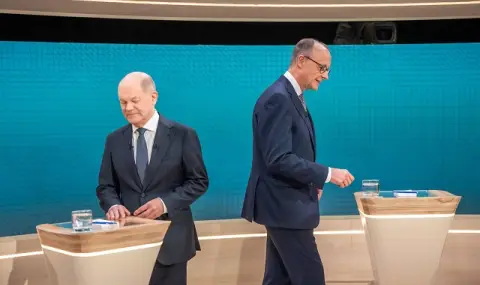"Friedrich Merz is running to take Europe to its grave", German Chancellor Olaf Scholz said during a debate in the Bundestag, Politico quoted him as saying.
Later in the debate, Merz responded to Scholz's comment.
"This federal government has been more negligent in its relations with Europe than any before it", he said. "Never before has a German government been met with so much criticism and so much contempt in Brussels.
German elections are not usually won or lost on the issue of the country's relations with the EU. But Germany's role in the bloc has become a key battleground between Scholz and Merz after a debate on Sunday night in which Scholz attacked Merz for his plans to reject mass returns of migrants at the border. According to Scholz, such a move would be contrary to EU law and undermine European solidarity at a time when Germany needs the EU most to confront US President Donald Trump and his tariff threats.
In parliament, Scholz continued this line of attack.
"If there is a country that benefits from a united Europe like no other, it is Germany," he said. "If the European Union is targeted by US tariffs, as is already happening with steel and aluminium, then we are more dependent on European solidarity than any other country. Do you think that solidarity will arise if Germany deliberately breaks European law, if Germany closes its borders? Do you think our neighbors will just go along with this? That is naive. It is detrimental to German interests.”
Merz hit back with a criticism he has often used in the past, claiming that Scholz and his failed triple coalition – which collapsed late last year due to ongoing internal battles over spending – had lost credibility in Brussels because of their indecisiveness.
Merz has repeatedly promised to provide more stable leadership on the European stage if he becomes chancellor. His conservative alliance is currently leading in opinion polls with 30 percent support, while Scholz’s Social Democratic Party (SPD) is third with 17 percent support.
"The ambiguity in our positions will not be repeated under my leadership," Merz stressed in a major foreign policy speech in late January, adding that it was part of Germany’s "responsibility" as Europe’s largest economy. Merz said he would introduce a national security council in the chancellery to better streamline and implement Germany's foreign policy goals and set clear priorities.
During a parliamentary debate on Tuesday, Germany's economy minister and Greens chancellor candidate Robert Habeck also attacked Merz over the effect his policies would have on the EU, arguing that his economic plans would end trust in the bloc when it comes to climate. Merz recently pledged to restore Germany's industrial competitiveness by putting climate policies on the back burner.
"If Germany votes against climate protection on February 23rd," Habeck noted, "then Europe will not want to meet its climate protection goals. And if Europe turns its back, then global climate protection will be over.
